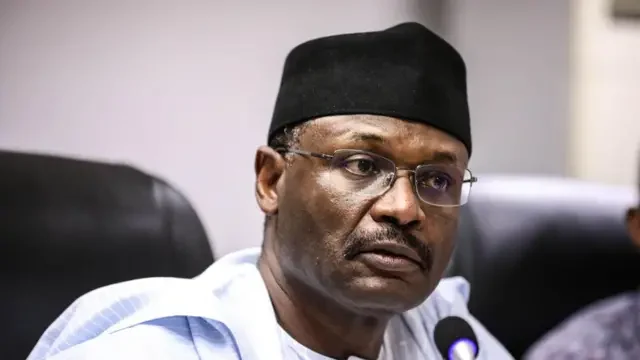THE immediate past Chairman of the Independent National Electoral Commission (INEC), Professor Mahmood Yakubu, has said that while technology has remarkably enhanced the credibility and efficiency of elections in Nigeria over the last decade, it remains incapable of completely eradicating the flaws that continue to undermine the nation’s electoral integrity.
Yakubu made this observation in a newly published 200-page book by the commission titled “Election Management in Nigeria: 2015–2025.” A copy of the publication, which chronicles INEC’s operations, achievements, innovations, and challenges during his two-term tenure, was obtained by News Point Nigeria.
In the foreword to the book, Yakubu described it as “the first and most comprehensive record of the milestones, lessons, and challenges” encountered during his leadership from 2015 to 2025. He reflected on what he termed a defining decade in Nigeria’s electoral history.
“The decade between 2015 and 2025 has been one of the most momentous in the history of election management in Nigeria,” Yakubu wrote. “There have been several milestones, many challenges, and useful lessons in the conduct and management of elections within this period.”
Under Yakubu’s leadership, INEC introduced several groundbreaking technologies aimed at enhancing transparency and efficiency in the electoral process. These included the Bi-Modal Voter Accreditation System (BIVAS), the INEC Voter Enrolment Device (IVED), the INEC Results Viewing (IReV) portal, and the expansion of polling units to improve voter access.
The book also highlights deliberate efforts to make the electoral process more inclusive. Yakubu noted that INEC implemented targeted policies to ensure participation of women, youths, persons with disabilities, and internally displaced persons (IDPs).
However, he acknowledged that despite technological and institutional progress, numerous challenges persist.
“The decade was not without its challenges,” he stated. “Issues such as multiple litigations, conflicting court orders, electoral violence, vote trading, and persistent logistical constraints continue to threaten the smooth conduct of elections.”
Yakubu cautioned that while digital tools have improved transparency, they are not a cure-all solution.
“Technology has undoubtedly advanced the process,” he said. “However, technical hitches such as equipment malfunction and connectivity failures have sometimes hindered the smooth conduct of elections.”
He explained that INEC, in response to these challenges, initiated reforms focusing on voter education, capacity building for election officials, and stronger collaboration with security agencies to safeguard personnel, voters, and materials during polls.
Yakubu emphasized that the future of Nigeria’s electoral system depends on sustained reforms, inclusivity, and public trust.
“The commission must fully embrace both successes and failures, intensify confidence-building measures, and continuously anticipate emerging threats to election management,” he said.
“Only through these steps can we ensure free, fair, credible, and inclusive elections, and consolidate democracy in Nigeria.”
Professor Yakubu, first appointed in October 2015 by former President Muhammadu Buhari, made history as the first INEC chairman to be reappointed for a second term in November 2020.
Before joining INEC, he served as Executive Secretary of the Tertiary Education Trust Fund (TETFund) and had a distinguished academic career as a professor of political history and international studies.
His tenure was marked by ambitious reforms. INEC, under his watch, conducted two general elections (2019 and 2023) and several off-cycle polls across Nigeria.
The introduction of BIVAS and IReV earned the commission praise for innovation but also sharp criticism during the 2023 general elections over logistical failures and technical glitches.
Despite these, Yakubu’s administration was widely credited for expanding voter participation and institutional reforms aimed at improving electoral transparency.
Following the completion of his term, President Bola Ahmed Tinubu honoured Yakubu with the national award of Commander of the Order of the Niger (CON) for his service to the nation.
The National Council of State has since approved the nomination of Professor Joash Amupitan as the new INEC Chairman, pending Senate confirmation. Meanwhile, National Commissioner May Agbamuche-Mbu continues to oversee the commission in an acting capacity.







